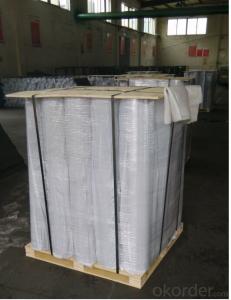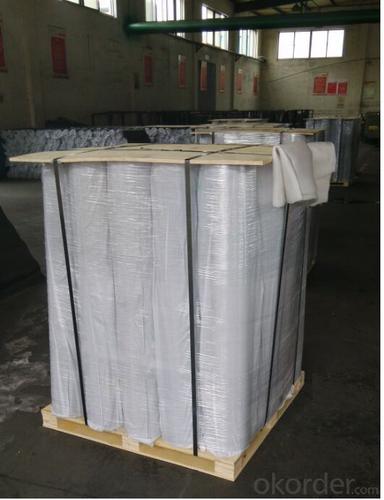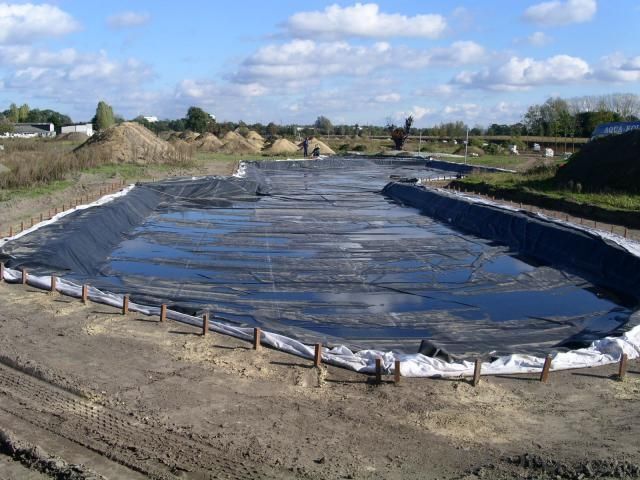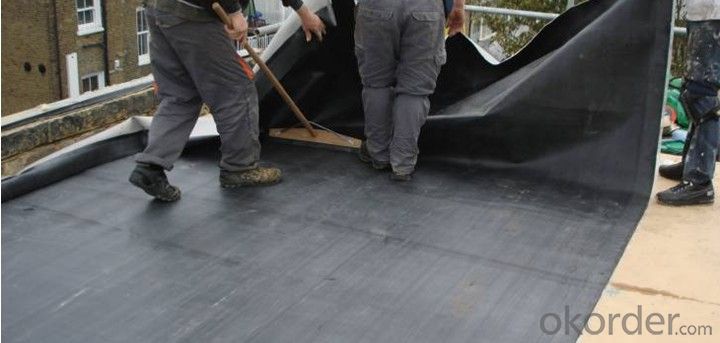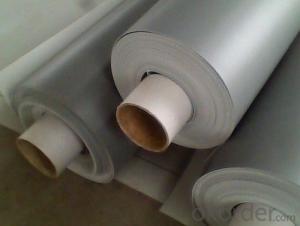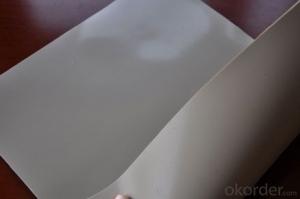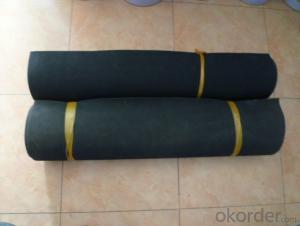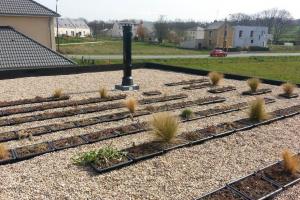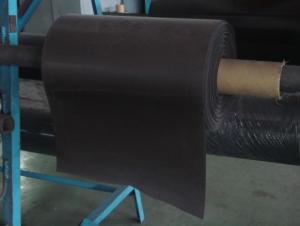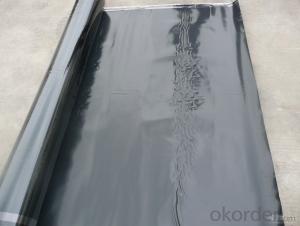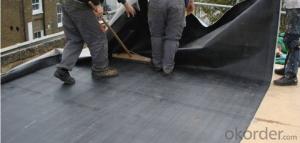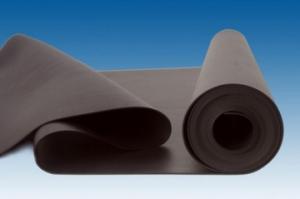EPDM Rubber Waterproof Membrane for Gardens
- Loading Port:
- Shanghai
- Payment Terms:
- TT OR LC
- Min Order Qty:
- 50000 m²
- Supply Capability:
- 5000000 m²/month
OKorder Service Pledge
OKorder Financial Service
You Might Also Like
EPDM Rubber Waterproof Membrane for Gardens
Description Of EPDM Rubber Waterproof Membrane for Gardens:
This waterproof coiled material is of high elasticity with best performance among high polumer waterproof coiled material in the world.It is also the most typical one in the world.Waterproof coiled material made of ternary ethylene-propylene rubber is produced with the use of the most advanced contiuous extrusion and vulcanization technology and related equipments which are specially designed for production of such product.It is good in compactness,without bubble and performance difference in length and breadth,perfomances reach or exceed the demands of GB18173.1-2000 standard.
Main Features of EPDM Rubber Waterproof Membrane for Gardens:
1.EPDM waterproof membrane for bridge engineering waterproof
2.EPDM waterproof membrane for water conservancy projects ,such as river bank,lake dam seepage.
3.EPDM waterproof membrane for the municipal engineering.
4.EPDM waterproof membrane for aquaculture.
Specifications of EPDM Rubber Waterproof Membrane for Gardens:
| Number | Item | Unit | Value | |
| 1 | Size Variation | Thichness | % | ±10 |
| Width | % | ±1 | ||
| Length | % | Allowed negative | ||
| 2 | Breaking tensile strength at normal temperature | Mpa | ≥7.5 | |
| Breaking tensile strength at 70°C | Mpa | ≥2.3 | ||
| 3 | Breaking elongation at normal temperature | % | ≥450 | |
| Breaking elongation at -20°C | % | ≥200 | ||
| 4 | Tear strength | KN/m | ≥25 | |
| 5 | Impermeability(30min) | * | 0.3Mpa no leakage | |
| 6 | Bending at low tempreture | °C | ≤-40 | |
| 7 | Stretch tensor at heating | Elongate | mm | ≤2 |
| Shrink | mm | ≤4 | ||
| 8 | Air oven aging(80°C×168h) | Tensile strength at break retained | % | ≥80 |
| Elongation at break retained | % | ≥70 | ||
| 9 | Anti-alkali | Tensile strength at break retained | % | ≥80 |
| Elongation at break retained | % | ≥80 | ||
| 10 | Nuture weathing at manual simulation | Tensile strength at break retained | % | ≥80 |
| Elongation at break retained | % | ≥70 | ||
Applications of EPDM Rubber Waterproof Membrane for Gardens:
Widely used in roofs, basement, toilet ,swimming pool, and all kinds of industry and civil building waterproofing, reservoir, vivicism, bridge, underground, tunnel and dam waterproofing ,especially to the keystone waterproofing projects which is durability, high corrosion resistance and easy deformation.
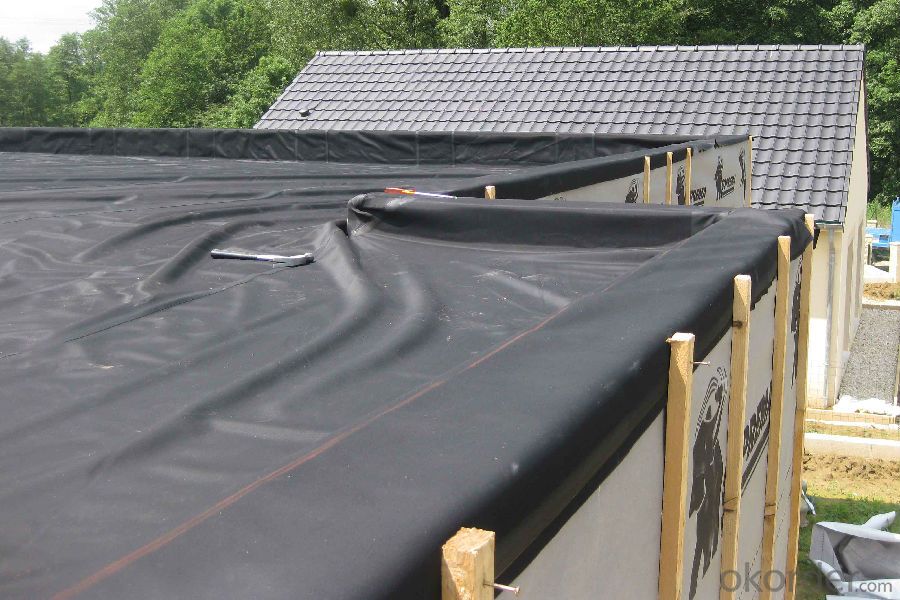
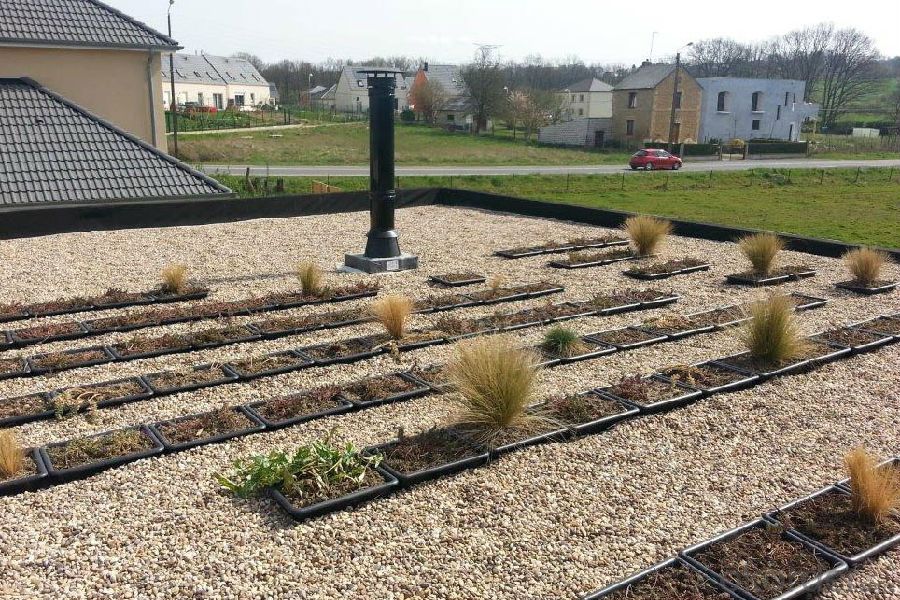
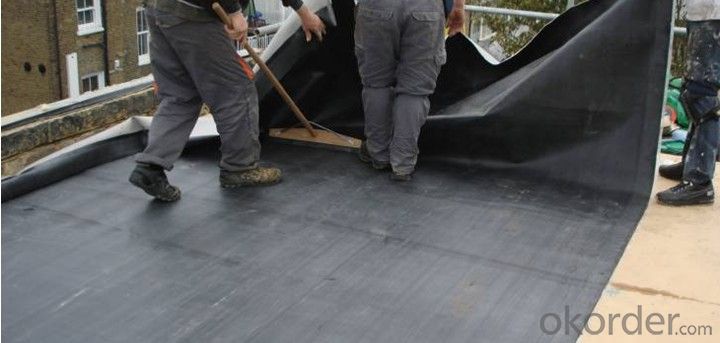
IMages of EPDM Rubber Waterproof Membrane for Gardens:
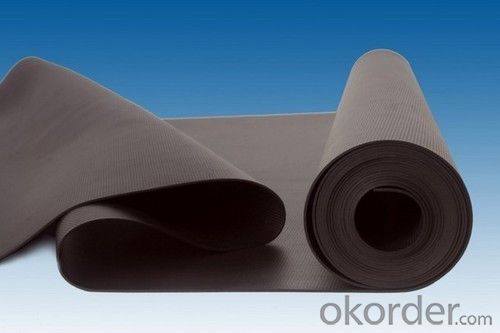
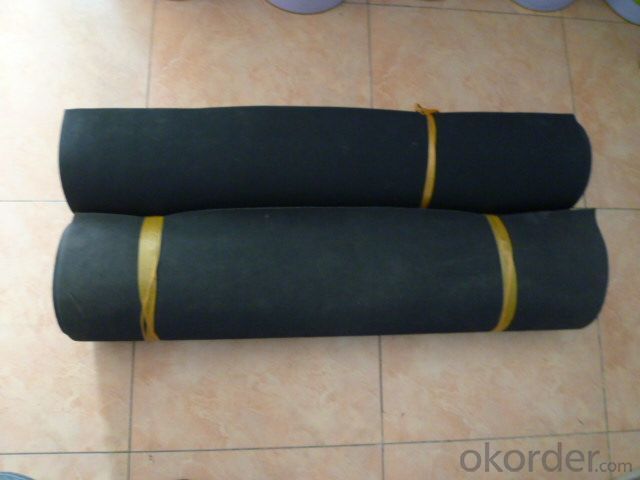
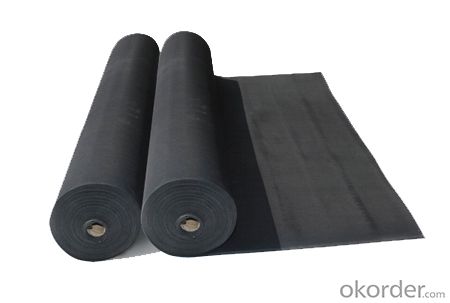
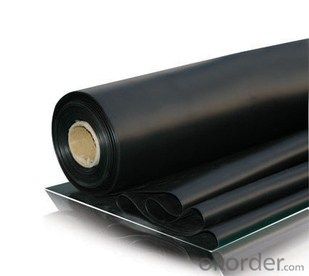
FAQ of EPDM Rubber Waterproof Membrane for Gardens:
1. What are we supplying?
We are specialized in producing Colorful Asphalt Roof Shingle, SBS/APP modified bitumen waterproof membrane, Self adhesive bitumen waterproof membrane, PVC waterproofing membrane, EPDM rubber roofing membrane, Single Component Polyurethane Waterproof Coating, and Spray Polyurea Waterproof Coating
.
2. How Many years experience do we have?
We have been exported to more than 20 countries in the past 15 years.
3. How long do we usually reply your request?
We always reply our customer within 24 hours.
- Q: Can a waterproofing membrane be used for a basement floor moisture barrier?
- Yes, a waterproofing membrane can be used as a basement floor moisture barrier. A waterproofing membrane is designed to prevent water from seeping through surfaces, making it an effective solution for keeping basements dry and free from moisture issues.
- Q: Can a waterproofing membrane be used for storage tanks or containment areas?
- Storage tanks or containment areas can utilize a waterproofing membrane to prevent water or liquid penetration. These membranes serve as a barrier against such infiltrations and are therefore ideal for containment purposes. Rubber, PVC, or bitumen are commonly used materials for these membranes due to their water-resistant properties. They can be applied either internally or externally to storage tanks or containment areas to safeguard against leaks and moisture-related deterioration. Moreover, the use of waterproofing membranes aids in preventing the development of mold or mildew, thereby ensuring a secure and hygienic environment for stored materials or liquids.
- Q: Can a waterproofing membrane be used in areas with high levels of moisture and humidity?
- Yes, a waterproofing membrane can be used in areas with high levels of moisture and humidity. Waterproofing membranes are specifically designed to prevent water penetration and can effectively protect surfaces from water damage even in damp and humid environments.
- Q: Can a waterproofing membrane be used on precast insulation surfaces?
- Yes, a waterproofing membrane can be used on precast insulation surfaces. The membrane acts as a protective barrier, preventing water penetration and ensuring the insulation remains dry and functional.
- Q: Can a waterproofing membrane be used for art installations or sculptures?
- Yes, a waterproofing membrane can be used for art installations or sculptures. Waterproofing membranes are commonly used in construction projects to prevent water infiltration and protect surfaces from moisture damage. In the context of art installations or sculptures, a waterproofing membrane can provide added durability and protection against environmental elements such as rain, snow, or humidity. This can be especially important for outdoor installations or sculptures that are exposed to the elements. Additionally, a waterproofing membrane can help preserve the integrity and longevity of the artwork, ensuring that it remains visually appealing and structurally sound over time. However, it is important to consult with professionals or experts in waterproofing to ensure the proper selection and application of the membrane, as different types may be more suitable for specific artistic materials or techniques.
- Q: Can a waterproofing membrane be used for elevator pits or sump pits?
- One can utilize a waterproofing membrane for elevator pits or sump pits. These pits are prone to water intrusion, making it crucial to safeguard them against water damage. The purpose of a waterproofing membrane is to establish a barrier that prevents water from permeating the pits and causing harm to the structure or equipment. By applying this membrane to the walls and floors of the pits, it assists in maintaining a dry environment and preventing water infiltration. This, in turn, helps prolong the lifespan of the elevator or sump pump system and avoids expensive repairs in the future. Proper installation and maintenance of the waterproofing membrane are imperative to ensure its effectiveness and durability.
- Q: Can a waterproofing membrane be used in basements?
- Yes, a waterproofing membrane can definitely be used in basements. In fact, it is highly recommended to use a waterproofing membrane in basements to protect against moisture intrusion and potential water damage. A waterproofing membrane is a thin layer of material that is applied to the external walls or floors of a basement to prevent water from seeping through. It acts as a barrier, effectively preventing water from entering the basement and keeping it dry. This is particularly important in areas where the water table is high, or in regions prone to heavy rainfall or flooding. By installing a waterproofing membrane, homeowners can greatly reduce the risk of water damage, mold growth, and other issues associated with excess moisture in the basement. It is important to note that proper installation and maintenance of the waterproofing membrane is crucial to ensure its effectiveness and longevity.
- Q: Can a waterproofing membrane be used for wastewater facilities?
- Yes, a waterproofing membrane can be used for wastewater facilities. Waterproofing membranes are commonly used in wastewater facilities to prevent water leakage and seepage. They provide an effective barrier against water infiltration and protect the structure from water damage. Additionally, these membranes are resistant to chemicals and can withstand harsh environmental conditions often found in wastewater facilities.
- Q: Are waterproofing membranes resistant to punctures?
- Yes, waterproofing membranes are designed to be resistant to punctures. These membranes are typically made from durable materials such as polyvinyl chloride (PVC), thermoplastic olefin (TPO), or ethylene propylene diene terpolymer (EPDM), which are known for their strength and ability to withstand external pressures. Additionally, waterproofing membranes are often reinforced with polyester or fiberglass to further enhance their puncture resistance. However, it is important to note that while waterproofing membranes are designed to be highly resistant to punctures, they may still be susceptible to damage if subjected to sharp objects or excessive force. Therefore, it is essential to handle and install these membranes with care to maintain their integrity and effectiveness.
- Q: Can a waterproofing membrane be used for water treatment plants?
- Yes, a waterproofing membrane can be used for water treatment plants. Waterproofing membranes are designed to prevent the passage of water and can be used to provide a barrier against water leakage in various structures, including water treatment plants. These membranes can be applied to different areas of the plant, such as tanks, reservoirs, pipes, and basements, to prevent water infiltration and protect the infrastructure from potential damage. Additionally, waterproofing membranes can help maintain the integrity of the water treatment process by ensuring that water remains contained within designated areas and does not seep into surrounding soil or structures.
Send your message to us
EPDM Rubber Waterproof Membrane for Gardens
- Loading Port:
- Shanghai
- Payment Terms:
- TT OR LC
- Min Order Qty:
- 50000 m²
- Supply Capability:
- 5000000 m²/month
OKorder Service Pledge
OKorder Financial Service
Similar products
Hot products
Hot Searches
Related keywords
